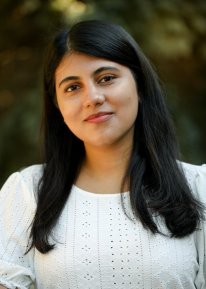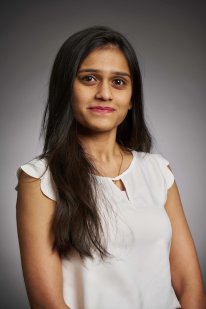Past events
Graduate Programs Online Information Session
Wednesday, July 10, 2024, 10 a.m. through Wednesday, July 10, 2024, 11 a.m.
Virtual meeting - RSVP online
During each session, the graduate staff will review:
- Requirements (general)
- Applying
- Prerequisite requirements
- What makes a strong applicant
- Funding
- Resources
- Common questions
- Questions from attendees
Students considering the following programs should attend:
2024 CS&E Undergraduate Student Graduation Event
Thursday, May 9, 2024, 9 a.m. through Thursday, May 9, 2024, 11 a.m.
University Recreation and Wellness Center - Beacon Room
123 SE Harvard St
Minneapolis, MN 55455
RSVP Link
Thursday, May 9th, 9 - 11 a.m.
University Recreation and Wellness Center - Beacon Room
Graduating undergraduate students and some of their families and friends are invited to join the Department of Computer Science & Engineering in celebrating their accomplishments. This is a casual event to mingle with other graduates, take photos, and listen to speakers. There will be light snacks and beverages at the event. This does not include a ceremony where names will be read and a stage crossing takes place.
Caps and gowns are optional. We recommend dressing nicely if you plan on attending without a cap and gown.
Parking options - UMN Parking website
- Washington Avenue Parking Ramp
- University Avenue Parking Ramp
- Oak Street Ramp
- Maroon lot in the TCF Bank Stadium
Student Speakers
Aparna Lohmor
 Aparna is an international student from India majoring in computer science. Starting a full time job soon in cybersecurity. Her hobbies are working out, gardening and painting. Aparna has been engaged in the community as a teaching assistant and through internships and research since freshman year of college.
Aparna is an international student from India majoring in computer science. Starting a full time job soon in cybersecurity. Her hobbies are working out, gardening and painting. Aparna has been engaged in the community as a teaching assistant and through internships and research since freshman year of college.
Ruth Mesfin
 Ruth Mesfin is the former president of ACM-W and the founder of Gopher Graphics. She has also accepted a full time position at Microsoft as a software Engineer.
Ruth Mesfin is the former president of ACM-W and the founder of Gopher Graphics. She has also accepted a full time position at Microsoft as a software Engineer.
College/University Commencement
2024 College of Science & Engineering Undergraduate Commencement
Thursday, May 9, 2024
3M Arena at Mariucci
Noon - Doors open to graduates and guests
1 p.m. - Ceremony begins
Ceremony will also be streamed live.
Formal Invitation (pdf)
Questions: csecommencement@umn.edu
Event website
2024 College of Liberal Arts Undergraduate Commencement
Sunday, May 12, 2024
3M Arena at Mariucci
Two ceremonies (according to CLA major): 11 am and 4 pm. Details will be released early in the Spring 2024 semester (check the CLA event page below for updates).
Questions: clacommence@umn.edu
Event website
CLA Commencement FAQ Page
ML Seminar: Constrained Continuous Optimization with First-Order Methods
Tuesday, April 30, 2024, 11 a.m. through Tuesday, April 30, 2024, Noon
Keller Hall 3-180 and via Zoom.
Beyond Adam: What Optimization Can Help Large Foundation Models
2024 CS&E Graduate Student Graduation Event
Friday, April 26, 2024, 9 a.m. through Friday, April 26, 2024, 11 a.m.
University Recreation and Wellness Center - Beacon Room
123 SE Harvard St
Minneapolis, MN 55455
RSVP Link
Friday, April 26, 9 - 11 a.m.
University Recreation and Wellness Center - Beacon Room
All graduating students from the Computer Science, Data Science, and Bioinformatics and Computational Biology graduate programs, as well as their families and friends are invited to join the Department of Computer Science & Engineering in celebrating their accomplishments. This is a casual event to mingle with other graduates, take photos, and listen to speakers. There will be light snacks and beverages at the event. This does not include a ceremony where names will be read and a stage crossing takes place.
Caps and gowns are optional. We recommend dressing nicely if you plan on attending without a cap and gown.
Parking options - UMN Parking website
- Washington Avenue Parking Ramp
- University Avenue Parking Ramp
- Oak Street Ramp
- Maroon lot in the TCF Bank Stadium
Speaker info
Name: Amrutha Shetty Jayaram Shetty
 I am originally from India, I pursued my undergraduate studies in Electronics and Communication at Dayananda Sagar College of Engineering in Bengaluru, India. With a naturally outgoing disposition, I have a passion for classical dance, enjoy singing, and thrive on engaging in lively conversations. Throughout my academic journey, I actively participated in various clubs and extracurricular activities, including taking on the role of Data Science Representative for the Council of Graduate Students.
I am originally from India, I pursued my undergraduate studies in Electronics and Communication at Dayananda Sagar College of Engineering in Bengaluru, India. With a naturally outgoing disposition, I have a passion for classical dance, enjoy singing, and thrive on engaging in lively conversations. Throughout my academic journey, I actively participated in various clubs and extracurricular activities, including taking on the role of Data Science Representative for the Council of Graduate Students.
Looking ahead, I aim to transition into the role of a Data Analyst at Wunderlich Malec Engineering in Eden Prairie, Minnesota, post-graduation. I'm drawn to the vibrant culture and myriad opportunities that Minnesota offers, and I'm eagerly anticipating making it my home for the foreseeable future.
College/University Commencement
Master's and Doctoral Degree Student Commencement
Friday, April 26, 2024 - 2 p.m.
3M Arena at Mariucci
Questions: asecommencement@umn.edu
Event website
The Arts, Sciences, and Engineering Graduate Commencement is hosted by the College of Liberal Arts (CLA) and the College of Science and Engineering (CSE).
CLA and CSE master’s, doctoral, and postbaccalaureate certificate students are invited to attend the spring 2024 commencement. Eligible students will receive an email in early February with instructions regarding how to register and participate in the ceremony.
Natural Language Processing Poster Presentations
Thursday, April 25, 2024, 2:30 p.m. through Thursday, April 25, 2024, 3:45 p.m.
Shepherd 164 (Drone Lab)
We are going to hold two poster presentation sessions.
- April 23, 2:30-3:45pm
- April 25, 2:30-3:45pm
Spring 2024 Posters
Group A - April 25, 2:30-3:45pm
Lexical decryptors Sandeep Bhuiya, Mudit Jantwal, Hemanth Kumar Tirupati, Shreya Yashodhar "Scientific Text Simplification" | NLPros Benjamin Kosieradzki, Mitchell Kosieradzki "Evaluating the Boundary between In-Context Learning and Fine-Tuning" | pnlp fiction Rakshithaa Kanakarajan Selvarathinam, Vishal Kancharla, Sri Krishna Vamsi Koneru, Devansh Mishra "Identifying Bias in LLMs when using LRLs" |
Syntax Errors Clayton Carlson, Ryan Diaz, Charlie Rapheal, Sanjali Roy "Leveraging Language Models for Temporal Political Bias Analysis" | Tattered-animals Zheng Robert Jia, Brandon Nee, Andrei Solodin, Jack Swanberg "LLM Prompt Recovery" | WordWizards Morgan Bozeman, Tyler Cook, Connor Holm, Derek Wong "Performance of LLMs in Various Styles" |
EdgeCaseWizards Apekshik Panigrahi, Anna Terzian "Terraform - Automating Infrastructure as a Service" | Team bRockoLee Jithendra Jagannatha Kagathi, Arjun Thonoor, Anirudh Vasudevan, Ya-Hui Yang "Transpilation" | Team SOTA Evan Way, Jerry Yin, Zaifu Zhan, Zhongxing Zhang "PaperHelper: Knowledge-Based LLM QA Paper Reading Assistant" |
Natural Language Processing Poster Presentations
Tuesday, April 23, 2024, 2:30 p.m. through Tuesday, April 23, 2024, 3:45 p.m.
Shepherd 164 (Drone Lab)
We are going to hold two poster presentation sessions.
- April 23, 2:30-3:45pm (group B)
- April 25, 2:30-3:45pm (group A)
Spring 2024 Posters
Group B - April 23, 2:30-3:45pm
Caught with N-grams Michael Bronstein, Yichen Li, Lavanya Radhakrishnan, Wuhao Zhang "Automated Detection and Refutation of Climate-related Misinformation" | Cybertron Gehna Jain, Ryan Langman, Trae Primm, Swapnil Puranik "Evaluation of Knowledge Graphs in LLMs" | Fury GPT Nikil Krishnakumar, Sujeendra Ramesh, Rammesh Adhav Saravanan "User Friendly Drone Control: Fine-Tuning Language Models with ROS Commands for Real-World Application" |
NLP Ninjas Nirshal Chandra Sekar, Byeongchan Jeong, Fidan Mahmudova, Sheshasai Sairam "Human - Robot Interaction using LLM" | SpotHRI Adam Imdieke "A Language Interface for the Spot Robot" | Transformers Ritwick Banerjee, Madhan Mohan, Leyan Sayeh, Masha Volkova "Disease Diagnosis using LLM" |
NLPitch Dhondup Dolma, Jaeeun Lee, Yongtian Ou, Jiyoon Pyo "Transidiomation: Optimizing translation of idioms embedded in text" | PRWZ Zaccheri Ciampone, Wyatt Kormick, Raymond Lyon, Preston Zhu "Research Paper Simplification" | Too Long; Didn’t Read Ryan Johnsen, Dylan Paulson, Logan Schaaf, Tony Zhang "Cuisine Fusion Recipe Generato" |
ML Seminar: Beyond Adam: What Optimization Can Help Large Foundation Models
Tuesday, April 23, 2024, 11 a.m. through Tuesday, April 23, 2024, Noon
Keller Hall 3-180 and via Zoom.
Beyond Adam: What Optimization Can Help Large Foundation Models
Spring 2024 Data Science Poster Fair
Friday, April 19, 2024, 10 a.m. through Friday, April 19, 2024, Noon
ABC room at the Campus Club in Coffman Memorial Union
There will be two, one hour long sessions, and student presenters will only need to present for one of the two sessions.
Spring 2024 Posters
Jashwin Acharya Advisor: Wei Pan, School of Public Health "Use of a large language model for few-shot learning to predict dementia" | Aviral Bhatnagar Advisor: Jaideep Srivastava, Department of Computer Science and Engineering "Genome Sequencing" | Jiahao He Advisor: Erich Kummerfeld, Institute for Health Informatics "Data processing, and predictive and causal modeling, to describe and understand MN K-12 health and education outcome disparities in a local school district" |
Jooyong Lee Advisor: Erich Kummerfeld, Institute for Health Informatics "Causal inference to identify factors contributing to a decrease in student's GPA" | Hahnemann Ortiz Advisor: Daniel Boley, Department of Computer Science and Engineering "Convergence of AI and DLT" | Jong Inn Park Advisor: Dongyeop Kang, Department of Computer Science and Engineering "Graphical Text Summarization Using Generative AI" |
Hari Veeramallu Advisor: Junaed Sattar, Department of Computer Science and Engineering "Study the feasibility of generating a top-down view of an Underwater Robot given an input stream from n RGB camera sensors." | Tianhong Zhang Advisor: Tianxi Li, School of Statistics "TBD" |
Venkata Sai Krishna Abbaraju Advisor: Jaideep Srivastava, Department of Computer Science and Engineering "Reviving lost data: Applying ML to impute missing data in factory datasets" | Dinesh Reddy Challa Advisor: William Northrop, Department of Mechanical Engineering "Influence of Snowfall on the Fuel Consumption of Winter Maintenance Vehicles" | Amrutha Shetty Jayaram Shetty Advisor: Dongyeop Kang, Department of Computer Science and Engineering "Bridging AI Dimensions: Small Model Precision Meets Large Model Depth in Therapy" |
Rahul Mehta Advisor: Erich Kummerfeld, Institute for Health Informatics "Causal Discovery Analysis on Bipolar Disorder Patients" | Sam Penders Advisor: Vuk Mandic, School of Physics and Astronomy "LIGO All-Sky Long-Duration Transient Search Using Deep Learning" | Eric Trempe Advisor: Tianxi Li, School of Statistics "Predicting Patient Cancer Types Through Medical Measures" |
Keith Willard Advisor: Xiaotong Shen, School of Statistics "Using BART generative synthetic data to improve BERT parsing of patient prescription instructions." | Linjun Xia Advisor: Erich Kummerfeld, Institute for Health Informatics "A Correlation and Causality Study of Student Behavioral Conditions with Health and Achievement in Hopkins public schools" |
ML Seminar: Numerical understanding of neural networks: from representation to learning dynamics
Tuesday, April 16, 2024, 11 a.m. through Tuesday, April 16, 2024, Noon
Keller Hall 3-180 and via Zoom.
Numerical understanding of neural networks: from representation to learning dynamics
CS-IDEA Self Defense Seminar
Monday, April 15, 2024, 9 a.m. through Monday, April 15, 2024, 11 a.m.
University Recreation and Wellness Center - Multipurpose Room 2
123 Harvard Street SE
Minneapolis, MN 55455
The CS-IDEA Committee is hosting a self-defense seminar for students, researchers, and staff in the Department of Computer Science & Engineering. There will be some physical contact with others during the seminar, mainly wrist grabs.
The event will be held on Monday, April 15 from 9-11 a.m. at the University Recreation and Wellness Center - Multipurpose Room 2.
Pizza and beverages will be provided at the conclusion of the event for participants. The event is free, but registration is required; please RSVP by Friday, April 12.
The Computer Science & Engineering (CS&E) department is committed to supporting and recruiting a diverse community of students, staff, and faculty and helping everyone in this community to thrive. This requires deliberate work to build an inclusive and supportive environment for those from historically underrepresented and non-traditional backgrounds. The Computer Science Inclusivity, Diversity, Equity, and Advocacy (CS-IDEA) committee aims to attract and retain diverse students, staff, and faculty in computer science and engineering and help all students, staff, and faculty thrive within the Department of Computer Science & Engineering at the University of Minnesota.
More About Department News and Events
- 2023-24 Colloquium Schedule
- Carlis Memorial Lecture Series
- Cray Distinguished Speaker Series
- Department news
- Soundbyte Magazine
- Upcoming events